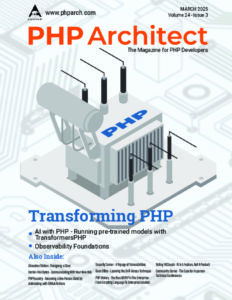There are pivotal events in our lives that happen, and we don’t understand how important they were until we’ve gone down the path those events have taken us down for years. That event for me was attending Midwest PHP in 2018. I was able to convince my boss at the time to pay for tickets, hotel rooms, and travel for both myself and the other developers in the company, and it forever changed my life. by Scott Keck-Warren
What does that even mean? by Chris Hartjes
A key reason for learning data warehousing techniques is the ability to stabilize feature development. When producing reports from your operational database, any changes to data, data structure, or data relationships can trigger a cascade of changes to otherwise unrelated reports when implementing the new feature. This month introduces the drill-across technique. by Edward Barnard
In the February 2025 issue, I spoke about all of the nice things we have in modern PHP in terms of class syntax. Constructs like parameter hoisting, visibility, and others go a long way to making writing classes much easier and cleaner than in earlier versions of PHP. by Chris Tankersley
PHP’s evolution from a modest scripting language to a powerhouse of enterprise solutions stands as one of technology’s most remarkable transformations. What began in 1994 as Rasmus Lerdorf’s simple set of Common Gateway Interface (CGI) binaries, designed merely to track visits to his online resume, has grown into a robust programming language that now powers an astounding 79.2% of all websites with known server-side programming languages. by Christopher Miller
In mid-January, software quality company Sonar [published a disclosure of several vulnerabilities](https://phpa.me/tainted-voyage) in the open source [Voyager admin system](https://voyager.devdojo.com/) for the Laravel framework. On their own, it might be easy to dismiss each individual vulnerability as relatively low-priority. But in concert, they’re fatal to the system. by Eric Mann
Repetitive tasks eat away at motivation. Running tests, checking code style, and ensuring best practices should be done before every commit or merge. How can we automate them to save time and effort? At the same time, automating routine tasks can free us up to focus our efforts on more important tasks. Whether you’re working on a solo project, part of a small team, or a cog in a larger shop, writing code is not the only part of our job. In this month’s article, you’ll learn how to automate tasks with GitHub actions. by Oscar Merida
In my last article, I discussed attracting, recruiting, and hiring people with disabilities—this time, I want to talk more about communication with your new hire. by Maxwell Ivey
Artificial Intelligence is a major trend right now, and there are many great AI-based SaaS solutions out there for us to use. However, we can also leverage the same techniques in our own applications without any external API calls and for free. This text will show you how you can use a tool that allows you to perform Natural Language Processing tasks (summarization, translation, text classification, sentiment analysis, etc.), Computer Vision (image classification, object detection, background removal), and even audio tasks (audio classification and speech recognition). by Vinicius Dias
Where do you start troubleshooting if a PHP application slows down or crashes? Logs might give you clues after the fact, and traces can pinpoint the bottlenecks, but before anything else, you need a real-time view of what is happening. This is where metrics come in. by Florian Engelhardt




Leave a comment
Use the form below to leave a comment: